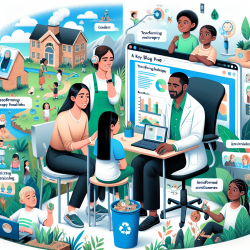Understanding the Intergenerational Impact of Mercury Exposure
The study titled "The Contribution across Three Generations of Mercury Exposure to Attempted Suicide among Children and Youth in Grassy Narrows First Nation, Canada: An Intergenerational Analysis" provides critical insights into the long-term effects of environmental toxins on mental health across generations. This research is particularly relevant for practitioners working in special education and mental health fields, as it highlights the complex interplay between environmental factors and psychological outcomes.
Key Findings from the Research
The research conducted by Mergler et al. (2023) investigates the impact of mercury exposure on the mental health of children and youth in the Grassy Narrows First Nation. The study utilized data from the Grassy Narrows Community Health Assessment and government biomonitoring programs to analyze the effects of mercury exposure across three generations.
Key findings include:
- Significant links between grandparents' mercury exposure and the mental health of their grandchildren.
- Maternal mercury exposure during pregnancy was associated with children's emotional and behavioral problems.
- The prevalence of attempted suicide among Grassy Narrows youth is three times higher than other First Nations in Canada.
Implications for Practitioners
For practitioners, these findings underscore the importance of considering environmental and historical factors when addressing mental health issues in children and youth. Here are some strategies to enhance practice:
- Holistic Assessment: Incorporate questions about environmental exposures and family history in mental health assessments.
- Interdisciplinary Collaboration: Work with environmental health experts to understand the broader context of the community's health challenges.
- Advocacy and Education: Educate families and communities about the potential impacts of environmental toxins and advocate for policies that address these issues.
Encouraging Further Research
While this study provides valuable insights, it also highlights the need for further research. Practitioners are encouraged to explore the following areas:
- Longitudinal studies to track the long-term mental health outcomes of individuals exposed to environmental toxins.
- Interventions that mitigate the psychological effects of such exposures.
- Community-based participatory research to empower affected communities and incorporate their perspectives.
To read the original research paper, please follow this link: The Contribution across Three Generations of Mercury Exposure to Attempted Suicide among Children and Youth in Grassy Narrows First Nation, Canada: An Intergenerational Analysis.










